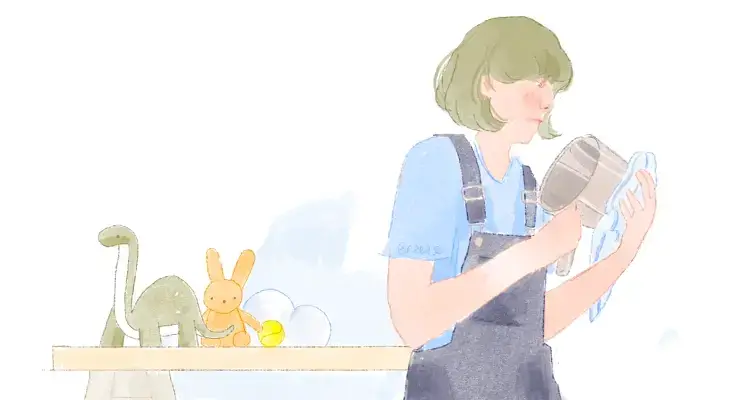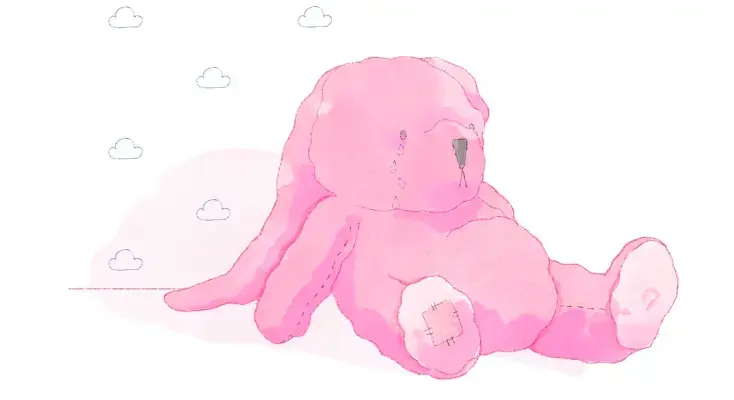Parentification is a way of raising kids in which kids sometimes put their own needs aside to care for their parents, siblings, or both. It is often called an “inversion of the natural child-parent roles.”
Even though they seem “mature” or “responsible” on the outside, adults with parentification trauma may have a lot of emotional and mental scars that last well into adulthood.
What is parentification trauma?
It’s a form of childhood trauma. In brief, parentification trauma happens when a child is given adult duties and is basically needed to parent their own caretakers or younger siblings.
Researchers on this topic say that children who are parentified often feel a deep sense of duty and responsibility toward their family. [1] Dr. Shirley Bach coined the concept of parentification in 1967. It is rooted in the idea that children can be forced to assume the role of a parent toward their own parents or other siblings. Afterward, Minuchin, Montalvo, and Guerney first introduced this concept in 1969 as a component of a dysfunctional family system.
Typically, parentification childhood trauma can happen in a family where parents are emotionally distant (e.g., emotionally unavailable mother), enmeshed, and emotionally immature. This type of trauma can also happen when there is substance use, mental illness, or parental absence within the family system.
2–8% of young people under 18 in high-income countries are young caregivers, according to a statistic. [2] According to research, this experience can be both unrecognized and overwhelming, leading to significant stress and a disruption of their own developmental path. [3]
When this role continues into adulthood, it can have lasting effects on your mental health, unresolved emotional baggage, relationships, and ability to form an identity separate from the family unit.
Take this parentification trauma self-test
Let’s start the self-check parentification quiz. Answer the following questions honestly, yes/no, to gain insight into your experiences:
- Did you often find yourself responsible for chores and tasks that were beyond what was typical for your age?
- Were you the go-to person for your parents when they needed emotional advice or support?
- Did it often feel like you were the parent and your parents were more like your children?
- Did you feel like you grew up quickly and became independent at a young age?
- Were you responsible for the well-being and care of your siblings?
- Do you feel like you missed out on your childhood because you were too busy managing adult responsibilities?
- Do you find it hard to trust others or rely on them for support?
- Do you struggle with setting personal boundaries, often prioritizing others over yourself?
- Do you have a heightened fear of being abandoned stemming from your childhood experiences?
- Do you find it challenging to maintain healthy relationships, often feeling overwhelmed or overly responsible?
If you answered “yes” to most of these questions, it might indicate that you experienced parentification.
Disclaimer
This article is for general informative and self-discovery purposes only. It should not replace expert guidance from professionals. Always consult your doctor or other certified health practitioner with any medical questions or concerns.
Breeze content team and its mental health experts disclaim any liability, loss, or risk, personal, professional, or otherwise, which may result from the use and/or application of any content.
7 signs you might have been parentified as a child
It is not always easy to spot the signs of parentified child trauma. Sometimes, these behaviors are so deeply ingrained that they seem like a natural part of your personality.
However, here are seven signs that you’ve likely been parentified in your childhood:
- You were the ‘family therapist’
- Responsibility became your middle name
- Your needs were secondary (or non-existent)
- Adulthood equals overprotection for you
- Emotional inseparability
- ‘Fun’ is a foreign concept for you
- Your adult relationship style is ‘fixer’
1. You were the ‘family therapist’
If family members often confided in you or turned to you as a mediator in conflicts, it may indicate having been parentified. Similarly, you may have had parents confide in you with content that was not age-appropriate. Being the emotional support or problem-solver at a young age is a role that parents, not their children, should fulfill.
2. Responsibility became your middle name
Parentified children are often highly responsible from a very young age. You were taking care of household chores, managing the family budget, or caring for younger siblings—all tasks that a parentified child may have assumed.
This heavy sense of duty might be a reason for a lost inner child and can translate into adult life as an overwhelming need to be responsible for others.
3. Your needs were secondary (or non-existent)
Parentified children often put the needs of their family before their own, sometimes to the point of personal neglect. This behavioral pattern may persist into adulthood, making it difficult to prioritize self-care or even identify your own needs.
4. Adulthood equals overprotection for you
Parents who’ve leaned on their children for support can foster a strong need for control and overprotection. You might find it challenging to give up on caretaking roles or feel intense anxiety when you’re not in a caregiving capacity.
5. Emotional inseparability
Difficulty in establishing healthy boundaries and the continual fear of disappointing others are common among those who’ve been parentified. This emotional enmeshment can lead to a lack of individual identity and self-esteem.
6. ‘Fun’ is a foreign concept for you
Because you had to take on parental responsibilities, you possibly missed out on experiencing carefree childhood moments. As a result, in your adult life, you might find it hard to engage in leisure activities or relax without feeling guilty or anxious.
7. Your adult relationship style is ‘fixer’
The experience of intimacy, both emotional and physical, can be fraught for those who were parentified. This also can be a symptom of a mother wound.
The line between caregiving and romantic love can blur, leading to a tendency to overextend in relationships. Or to find oneself attracted to partners who require ‘fixing.’
In adult relationships, you may instinctively take on the role of the caregiver or the one who ‘fixes’ problems, mirroring the behavior learned in parentification.
8 types of parentification
1. Emotional parentification
This form of parentification happens when a child becomes a surrogate caregiver for their parent’s emotional needs. Children in these situations often feel responsible for keeping their parents happy. They can be their “listening ears” or deal with their parents’ frequent emotional swings.
Generally, emotional parentification can cause a child to feel sensitive and hypervigilant to stress occurring within the family.
2. Instrumental parentification
Children who are instrumentally parentified have to do more than just meet their parents’ emotional needs. They also have to do logistical things like cook, clean, or even manage the family finances. These children often experience a role-reversal where they become the caregiver, developing high levels of competence and self-reliance. But, unfortunately, often at the cost of their own developmental and emotional needs.

3. Parentified peer parenting
In some cases, siblings or other children become the primary caretakers for each other. This pattern is called parentified peer parenting. The absence or incapacity of the adults in the home forces children to turn to each other for support. This results in a family structure where each child’s needs take a backseat from the others.
4. Intimate parentification
A common type of parentification is intimate parentification, in which a child is expected to meet the parent’s need for companionship, talk about adult issues, and even be a confidante in the parent’s romantic relationships. This kind of relationship crosses a lot of boundaries and can be too much for the child. Often making it hard for them to attach and get close in adult relationships. This can also be attachment trauma.
5. Narcissistic parentification
When a child expects to feed their parents’ ego, get praise from their parents, and improve their parents’ self-esteem, this is narcissistic parentification. These children often bear the brunt of their parents’ emotional and sometimes physical needs. Often, they have little to no acknowledgment of their own desires or successes. The adult versions of these kids may often ask themselves, “Why do I feel so empty?”
6. Sexualized parentification
It is the most distressing type of parentification. This is a deeply damaging dynamic. Some children take on roles that resemble romantic or sexualized relationships. This may be seen in cases of incest and is known as sexualized parentification.
7. Parentified savior
The parentified savior feels compelled to take on the parental role, not just because of neglect, but because they are actively convinced they are “saving” their parent through their care.
This form of parentification is often found in families with a parent who is struggling with substance misuse or mental illness. It drives the child to be the parent’s anchor and source of their mental well-being.
8. Spousification
Spousification is a form of parentification where a child is expected to meet the emotional needs of a parent due to the absence of a spouse or a divorced parent’s emphasis on their child’s emotional support above being a caretaker for their child.
What are the causes of parentification trauma?
This issue stems from a lack of parental support or emotional resources, either due to mental illness, substance abuse, divorce, abandonment trauma, or another trauma within the family unit.
In all cases, the parent is unable to meet their child’s developmental needs fully.
Let us look at some common types of parents that can cause parentification trauma.
Emotionally immature parents
Broadly speaking, emotionally immature parents struggle to regulate their own emotions and respond appropriately to their children’s emotional needs.
This can range from a subtle lack of attunement to deep neglect or abuse. It can be in various ways, such as
- An inability to regulate and express emotions in healthy ways
- Self-centeredness or inability to consider their child’s perspective
- Poor boundary setting, leading to enmeshment trauma in kids
- They may treat their children more like peers, oversharing personal information, or expecting emotional support, which should be the parent’s role
- Inability to handle “adult duties,” including daily or financial responsibilities
All of the things parents do in case they are not emotionally mature parents can “inspire” their children to become people who care. There are many effects on children who grow up in these kinds of places.
It can range from not being able to form secure attachments to not getting the emotional nurturing they need.

Eggshell parents
When a child “walks on eggshells” around a parent, it is usually because they do not want to set off their volatile emotions or reactions. This is a clear sign that the child’s role is reversed.
Eggshell parents create an environment where children feel responsible for the parents’ well-being, a weight that can be overwhelming and result in long-lasting anxiety and parentification trauma.
Emotionally unavailable parents
Children whose caregivers are emotionally unavailable due to factors such as mental illness, addiction, or extreme work demands find themselves compensating for these deficits.
They may take on the tasks of parenting younger siblings or emotionally supporting their parents.
Often, the emotional unavailability of a parent is rooted in their own upbringing, a vicious cycle of trauma, and unintentionally transferred emotional neglect.
Impact of parentification trauma on mental health
In adulthood, those who were parentified children often struggle with a sense of guilt and might ask, “Why do I always feel guilty?”.
These feelings can be deeply ingrained, which can make it hard to set boundaries and be kind to yourself (especially if your emotional needs were not met during your childhood).
For many adult parentification trauma survivors, the parentified role might be a template for personal relationships as well.
Some of you may shy away from relationships, fearing the vulnerability and emotional exposure they entail. Some people choose to be alone. It may feel safer to avoid the complicated dance associated with being vulnerable with others.
As the person struggles with the idea that they need to keep everyone and everything together all the time (parentification trauma), it can also cause mental health issues like depression and anxiety disorders.
Is parentification abuse?
Initially, it is important to note that deciding if parentification is abuse is a complicated and multifaceted matter.
At its core, parentification means giving a child adult responsibilities, which can disrupt the natural balance between a parent and a child.
Although parentification is rarely done on purpose, the emotional and mental stress it puts on a child can be similar to what happens in more obvious cases of emotional neglect or emotional abuse.
A big part of the difference is usually how much and how long the children were responsible for something they were not supposed to. That, and how well they can handle those duties without hurting their child’s growth and mental health.
Understanding the thin line between family working together during emergencies and giving kids too many adult responsibilities all the time is important for nurturing healthy family relationships.
Healing and recovery from parentification trauma
Healing from parentification involves recognizing its impact and taking steps to reclaim one’s personal growth and well-being. Here are strategies to consider for those who resonate with the signs and impacts outlined above:
- Develop Self-Awareness: Self-awareness is key to recognizing the ways in which parentification has shaped your life. By understanding your behaviors and thought patterns, you can begin to make conscious choices that better align with your personal needs and goals.
- Establish Healthy Boundaries: Learning to say ‘no’ and setting limits on what you’re willing to take on is crucial. Boundaries protect your time, energy, and mental health, and they’re an important step in reclaiming your identity outside of the parentified role.
- Reconnect with your Inner Child: Engage in activities that bring back the joy of childhood or initiate a sense of joy you haven’t experienced in the past. Reconnect with hobbies, interests, and experiences that allow you to be carefree and experience life without the weight of responsibility.
- Prioritize Self-Care: Make a commitment to prioritize self-care. This may involve seeking out support networks, engaging in regular exercise, maintaining a balanced diet, and pursuing hobbies that bring you joy.
- Embrace Your Independence: Recognize and celebrate the independence you’ve attained. Whether through education, career, or personal growth, acknowledging your achievements can boost your self-esteem and affirm your ability to lead a fulfilling life on your terms.
Sources
- Encyclopedia of Adolescence (pp.2023-2031) Chapter: Parentification Publisher: Springer New YorkEditors: Levesque, Roger J.R.
- King T.L. Young carers in the COVID-19 pandemic: Risks for mental health. Lancet Reg. Health West. Pac. 2021;16:100307. doi: 10.1016/j.lanwpc.2021.100307.
- Van Loon, L. M., Van de Ven, M. O., Van Doesum, K. T., Hosman, C. M., & Witteman, C. L. (2017). Parentification, Stress, and Problem Behavior of Adolescents who have a Parent with Mental Health Problems. Family process, 56(1), 141–153. https://doi.org/10.1111/famp.12165
Disclaimer
This article is for general informative and self-discovery purposes only. It should not replace expert guidance from professionals.
Any action you take in response to the information in this article, whether directly or indirectly, is solely your responsibility and is done at your own risk. Breeze content team and its mental health experts disclaim any liability, loss, or risk, personal, professional, or otherwise, which may result from the use and/or application of any content.
Always consult your doctor or other certified health practitioner with any medical questions or concerns
Breeze articles exclusively cite trusted sources, such as academic research institutions and medical associations, including research and studies from PubMed, ResearchGate, or similar databases. Examine our subject-matter editors and editorial process to see how we verify facts and maintain the accuracy, reliability, and trustworthiness of our material.
Was this article helpful?




